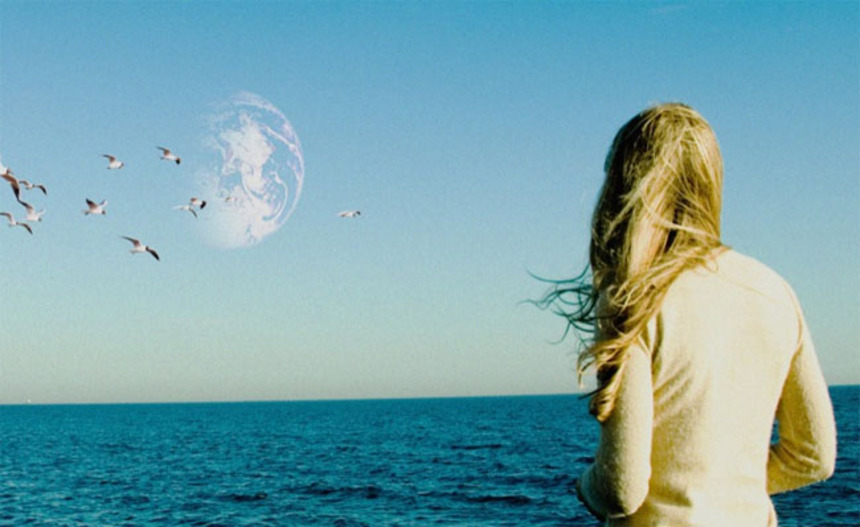Fantasia 2011: ANOTHER EARTH Review

What I really love about the ideas and concepts in Quantum Mechanics theory is that nothing makes any sort of intuitive sense yet at the moment, within the scientific consensus as our 'reality.' The math, an Alice in Wonderland-like rabbit hole - there is a book called Alice in Quantumland that acts as both a whimsical and accurate primer on the subject - just seems to hold things together although we would have to trust the few folks that understand it like we would, say, priests. Another Earth takes the premise of multiple, yet slightly varied states of existence, and creates an interesting situation to hang a character drama on. A second earth, identical to our own plunks itself pretty much into orbit one day. Dubbed Earth 2, humanity are collectively rapt with what exactly this means; in particular when a SETI professor contacts 'herself' on the other planet who is also making an attempt to contact. Who is Earth 1 and who is Earth 2? Rather than play this out on a large and global scale which was neither the intent or within any sort of budget allowance, the film plays out the scenario with the emotional happiness of two people. Both of whom suffer as the direct (and random) consequence of the arrival of Earth 2.
Rhoda is a promising M.I.T. undergraduate who, on night of drunken partying, the same night the new planet appears, destroys several innocent lives in a car accident. Four years of prison time and a promising academic career ruined, her emotional scars are still raw after her release from prison. The eponymous blue orb in the sky looms so large over ours that we cannot help see it at all times. The big 'what if it didn't' that you go over and over in your head when something bad happens happens to you.
The thought is not lost on a depressed and insular Rhoda. She has started stalking and eventually interacting with the Harvard music professor whose family life was demolished on that night four years prior. She has taken to avoiding much contact with her family or re-engaging with life, any contact with her peers (and their successes) is awkward and humiliating. Instead she takes a job well beneath her, a janitorial position at her old highschool, and moonlights cleaning the professor's home once a week. He doesn't recognize who Rhoda is, lost in the funk of his own depression, but both people find a very unorthodox connection which might perhaps enable them to climb out of the own personal pits of despair. Much like Tadanobu Asanou dissecting his dead girlfriend in Vital, proximity to the symbol of ones pain acts as self-flagellation and a potential path to healing. In the meantime, Rhoda, enters the contest of a rich Australian billionaire who is financing a private space-flight to the other planet and holding a contest for a couple of the seats people with a reason (in 500 words or less) to bestow a freebie ticket. Exposition in the background (note a cameo of Isaac Asimov's Foundations, the ultimate exposition-heavy science fiction novel) and drama in the foreground which eventually collide into something that is both surprising and inevitable. Another Earth has one of those great ambiguous film endings (similar to the emotional and intellectual reponse to the final shot of Shutter Island or Inception) that demand immediate and passionate conversation. The film may be far more interested in the emotional games we play with ourselves when dealing with personal responsibility than Jodie Foster and Tom Skerritt politicking for research grants and untangling alien technology but when it gets there, it has the same sort of vibe and spirit as the cosmos and a persons emotional interior; space travel as an act of personal and spiritual growth.
Brit Marling, so gorgeous on the poster image, is de-glamourized with the films grotty cinematography, but turns in a nuanced and believable performance from a script that can at times play convenient character beats, but is surpassingly effective in how it can make a point with a story. An anecdote about a Soviet cosmonaut haunted by a persistent noise is evocative, insightful, and transcends what could be seen as making the films the films themes literal and over-explained. A simple and silly bout of Wii boxing can be as as much of an emotional balm as unexpected music from a metal saw miraculously avoid the hammering obviousness of something like the clumsy 'dog speech' in Paul Haggis' Million Dollar Baby. In fact the light touch of this Wii scene is reminiscent to a certain karaoke scene in Lost in Translation (or maybe this is because Coppola also used a wii effectively in Somewhere.) William Mapother (who I generally think of as a the creepy doppelgänger of Nathan Fillion) has an even more challenging role, one particularly subject to screenplay mechanics which he manages to, nevertheless, sell completely. Together, they are the core of the film, and their complicated relationship is as unlikely as the second planet hanging in the night sky. But as a romanticized notion, again the point of this film, it works like gangbusters.
Another Earth is the kind of film that demands conversation after the end credits roll, and ending that is both surprising and inevitable and loaded with sticky consequence, something ambiguous enough that you can read it as simultaneously happy and sad. The quantum mechanical equivalent of opening Shrödinger's box and finding the cat both dead and alive and having tea with itself. In a way, one could say that Another Earth a bit of cinematic heaven.
Another Earth
Director(s)
- Mike Cahill
Writer(s)
- Mike Cahill
- Brit Marling
Cast
- William Mapother
- Brit Marling
- Matthew-Lee Erlbach
- DJ Flava

Do you feel this content is inappropriate or infringes upon your rights? Click here to report it, or see our DMCA policy.






